International Law, WTO and Trade Law: A Comprehensive Analysis
VerifiedAdded on 2022/08/16
|17
|4074
|28
Report
AI Summary
This report provides a comprehensive analysis of the World Trade Organization (WTO), examining its role as a universal international organization governing trade rules. It delves into the WTO's dispute resolution body, highlighting its function in resolving trade-related conflicts and its adherence to public international law. The report explores the impact of the rule of law on international trade, emphasizing its role in ensuring fairness and predictability within the global trading system. It discusses the objectives of the rule of law doctrine, including maintaining equality and administering justice, while also acknowledging the limitations and challenges faced by international law. The report concludes by emphasizing the importance of the WTO in promoting peace and facilitating international trade, while adhering to the principles of the rule of law to maintain a fair and equitable environment for all member countries. The report also highlights the various practices employed by the dispute settlement body in resolving trade disputes, including consultations and panel formation.
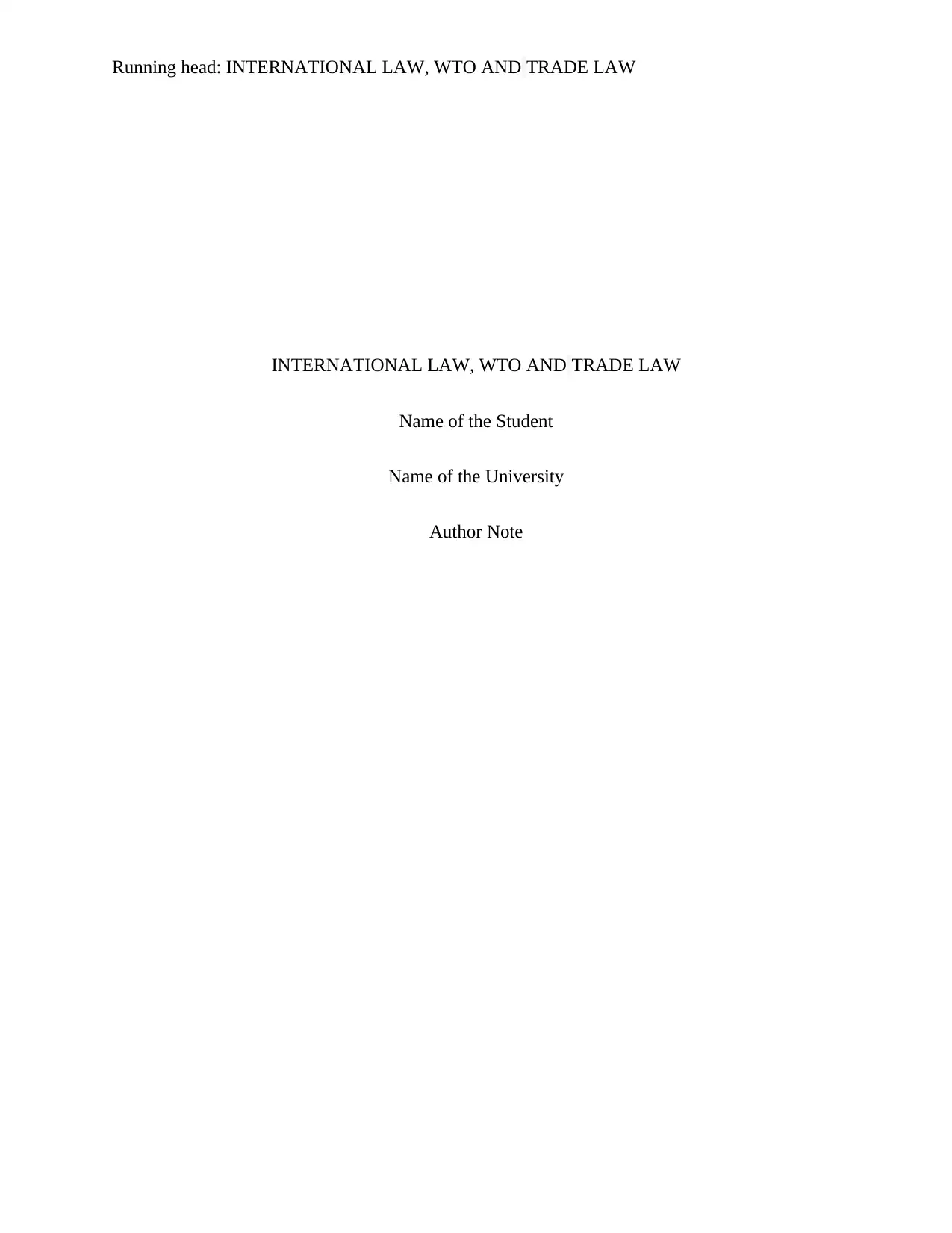
Running head: INTERNATIONAL LAW, WTO AND TRADE LAW
INTERNATIONAL LAW, WTO AND TRADE LAW
Name of the Student
Name of the University
Author Note
INTERNATIONAL LAW, WTO AND TRADE LAW
Name of the Student
Name of the University
Author Note
Paraphrase This Document
Need a fresh take? Get an instant paraphrase of this document with our AI Paraphraser
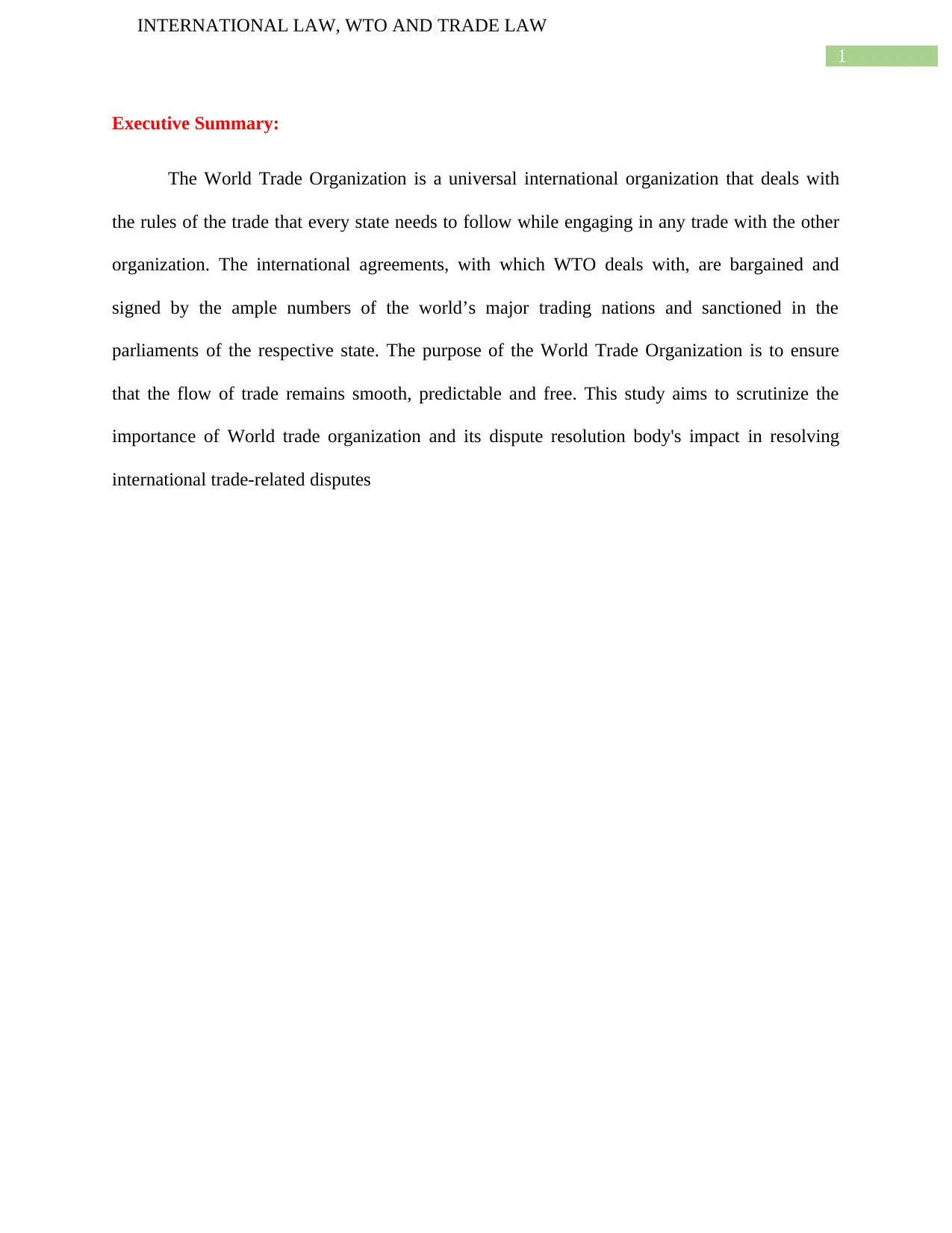
1
INTERNATIONAL LAW, WTO AND TRADE LAW
Executive Summary:
The World Trade Organization is a universal international organization that deals with
the rules of the trade that every state needs to follow while engaging in any trade with the other
organization. The international agreements, with which WTO deals with, are bargained and
signed by the ample numbers of the world’s major trading nations and sanctioned in the
parliaments of the respective state. The purpose of the World Trade Organization is to ensure
that the flow of trade remains smooth, predictable and free. This study aims to scrutinize the
importance of World trade organization and its dispute resolution body's impact in resolving
international trade-related disputes
INTERNATIONAL LAW, WTO AND TRADE LAW
Executive Summary:
The World Trade Organization is a universal international organization that deals with
the rules of the trade that every state needs to follow while engaging in any trade with the other
organization. The international agreements, with which WTO deals with, are bargained and
signed by the ample numbers of the world’s major trading nations and sanctioned in the
parliaments of the respective state. The purpose of the World Trade Organization is to ensure
that the flow of trade remains smooth, predictable and free. This study aims to scrutinize the
importance of World trade organization and its dispute resolution body's impact in resolving
international trade-related disputes
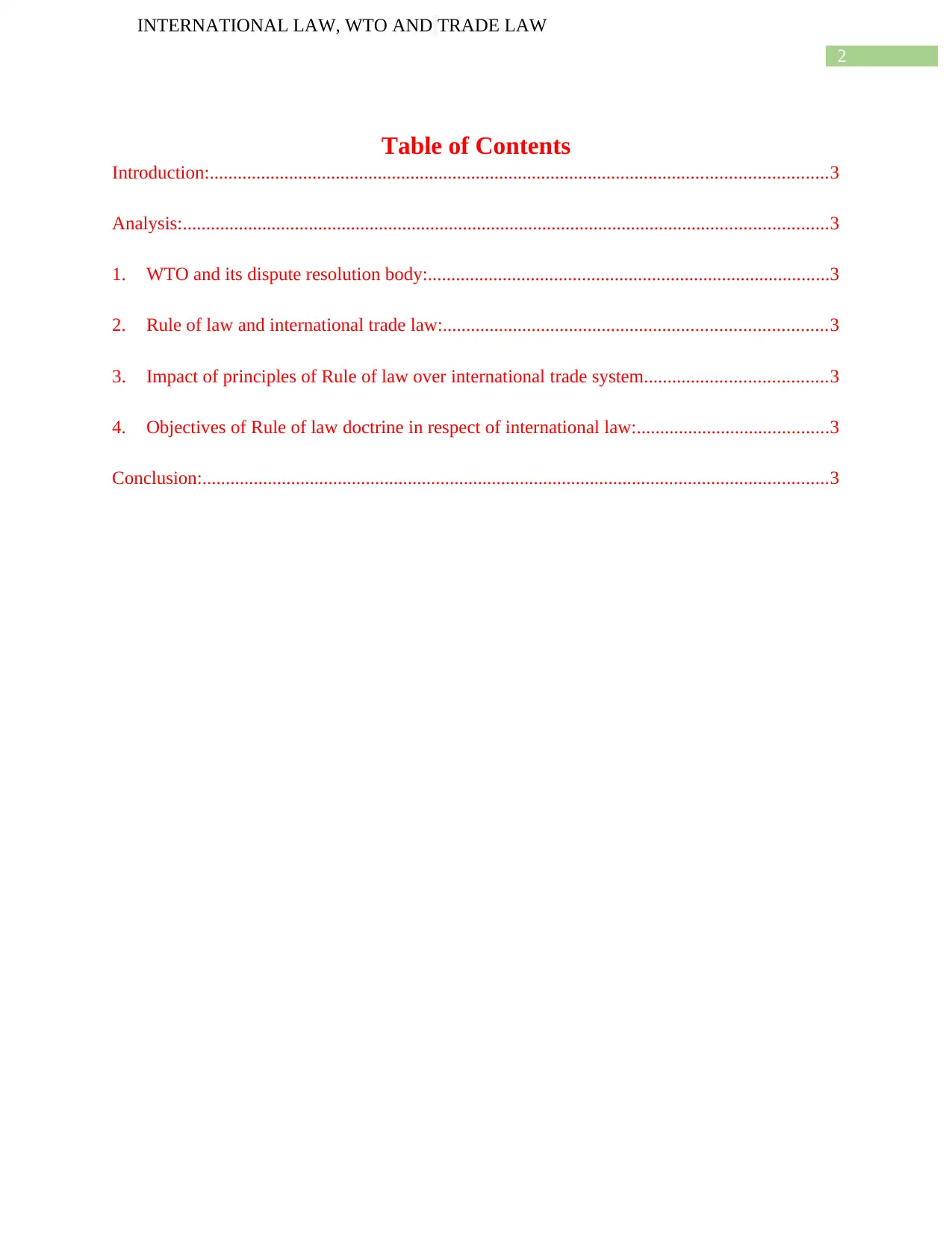
2
INTERNATIONAL LAW, WTO AND TRADE LAW
Table of Contents
Introduction:....................................................................................................................................3
Analysis:..........................................................................................................................................3
1. WTO and its dispute resolution body:......................................................................................3
2. Rule of law and international trade law:..................................................................................3
3. Impact of principles of Rule of law over international trade system.......................................3
4. Objectives of Rule of law doctrine in respect of international law:.........................................3
Conclusion:......................................................................................................................................3
INTERNATIONAL LAW, WTO AND TRADE LAW
Table of Contents
Introduction:....................................................................................................................................3
Analysis:..........................................................................................................................................3
1. WTO and its dispute resolution body:......................................................................................3
2. Rule of law and international trade law:..................................................................................3
3. Impact of principles of Rule of law over international trade system.......................................3
4. Objectives of Rule of law doctrine in respect of international law:.........................................3
Conclusion:......................................................................................................................................3
⊘ This is a preview!⊘
Do you want full access?
Subscribe today to unlock all pages.

Trusted by 1+ million students worldwide
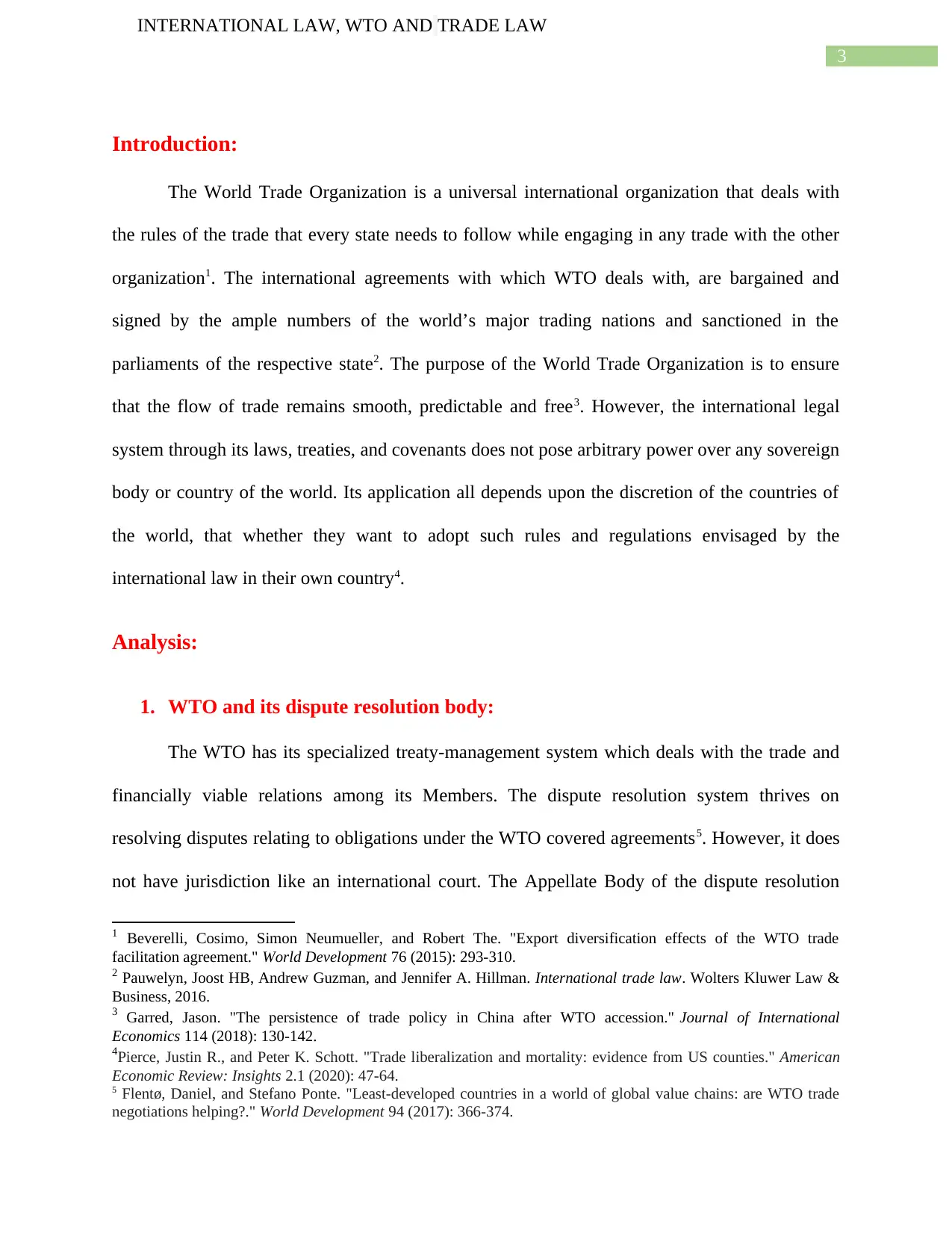
3
INTERNATIONAL LAW, WTO AND TRADE LAW
Introduction:
The World Trade Organization is a universal international organization that deals with
the rules of the trade that every state needs to follow while engaging in any trade with the other
organization1. The international agreements with which WTO deals with, are bargained and
signed by the ample numbers of the world’s major trading nations and sanctioned in the
parliaments of the respective state2. The purpose of the World Trade Organization is to ensure
that the flow of trade remains smooth, predictable and free3. However, the international legal
system through its laws, treaties, and covenants does not pose arbitrary power over any sovereign
body or country of the world. Its application all depends upon the discretion of the countries of
the world, that whether they want to adopt such rules and regulations envisaged by the
international law in their own country4.
Analysis:
1. WTO and its dispute resolution body:
The WTO has its specialized treaty-management system which deals with the trade and
financially viable relations among its Members. The dispute resolution system thrives on
resolving disputes relating to obligations under the WTO covered agreements5. However, it does
not have jurisdiction like an international court. The Appellate Body of the dispute resolution
1 Beverelli, Cosimo, Simon Neumueller, and Robert The. "Export diversification effects of the WTO trade
facilitation agreement." World Development 76 (2015): 293-310.
2 Pauwelyn, Joost HB, Andrew Guzman, and Jennifer A. Hillman. International trade law. Wolters Kluwer Law &
Business, 2016.
3 Garred, Jason. "The persistence of trade policy in China after WTO accession." Journal of International
Economics 114 (2018): 130-142.
4Pierce, Justin R., and Peter K. Schott. "Trade liberalization and mortality: evidence from US counties." American
Economic Review: Insights 2.1 (2020): 47-64.
5 Flentø, Daniel, and Stefano Ponte. "Least-developed countries in a world of global value chains: are WTO trade
negotiations helping?." World Development 94 (2017): 366-374.
INTERNATIONAL LAW, WTO AND TRADE LAW
Introduction:
The World Trade Organization is a universal international organization that deals with
the rules of the trade that every state needs to follow while engaging in any trade with the other
organization1. The international agreements with which WTO deals with, are bargained and
signed by the ample numbers of the world’s major trading nations and sanctioned in the
parliaments of the respective state2. The purpose of the World Trade Organization is to ensure
that the flow of trade remains smooth, predictable and free3. However, the international legal
system through its laws, treaties, and covenants does not pose arbitrary power over any sovereign
body or country of the world. Its application all depends upon the discretion of the countries of
the world, that whether they want to adopt such rules and regulations envisaged by the
international law in their own country4.
Analysis:
1. WTO and its dispute resolution body:
The WTO has its specialized treaty-management system which deals with the trade and
financially viable relations among its Members. The dispute resolution system thrives on
resolving disputes relating to obligations under the WTO covered agreements5. However, it does
not have jurisdiction like an international court. The Appellate Body of the dispute resolution
1 Beverelli, Cosimo, Simon Neumueller, and Robert The. "Export diversification effects of the WTO trade
facilitation agreement." World Development 76 (2015): 293-310.
2 Pauwelyn, Joost HB, Andrew Guzman, and Jennifer A. Hillman. International trade law. Wolters Kluwer Law &
Business, 2016.
3 Garred, Jason. "The persistence of trade policy in China after WTO accession." Journal of International
Economics 114 (2018): 130-142.
4Pierce, Justin R., and Peter K. Schott. "Trade liberalization and mortality: evidence from US counties." American
Economic Review: Insights 2.1 (2020): 47-64.
5 Flentø, Daniel, and Stefano Ponte. "Least-developed countries in a world of global value chains: are WTO trade
negotiations helping?." World Development 94 (2017): 366-374.
Paraphrase This Document
Need a fresh take? Get an instant paraphrase of this document with our AI Paraphraser
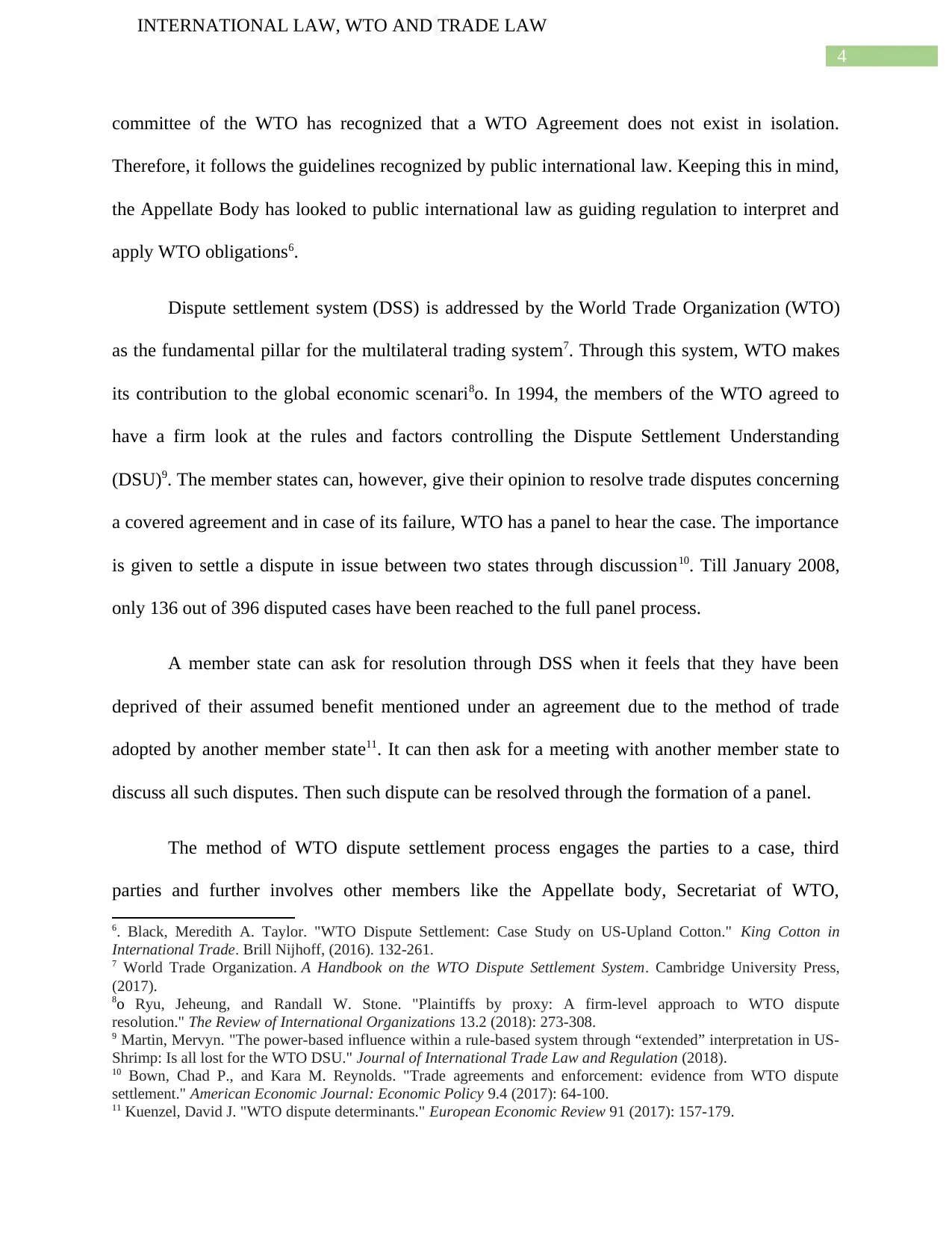
4
INTERNATIONAL LAW, WTO AND TRADE LAW
committee of the WTO has recognized that a WTO Agreement does not exist in isolation.
Therefore, it follows the guidelines recognized by public international law. Keeping this in mind,
the Appellate Body has looked to public international law as guiding regulation to interpret and
apply WTO obligations6.
Dispute settlement system (DSS) is addressed by the World Trade Organization (WTO)
as the fundamental pillar for the multilateral trading system7. Through this system, WTO makes
its contribution to the global economic scenari8o. In 1994, the members of the WTO agreed to
have a firm look at the rules and factors controlling the Dispute Settlement Understanding
(DSU)9. The member states can, however, give their opinion to resolve trade disputes concerning
a covered agreement and in case of its failure, WTO has a panel to hear the case. The importance
is given to settle a dispute in issue between two states through discussion10. Till January 2008,
only 136 out of 396 disputed cases have been reached to the full panel process.
A member state can ask for resolution through DSS when it feels that they have been
deprived of their assumed benefit mentioned under an agreement due to the method of trade
adopted by another member state11. It can then ask for a meeting with another member state to
discuss all such disputes. Then such dispute can be resolved through the formation of a panel.
The method of WTO dispute settlement process engages the parties to a case, third
parties and further involves other members like the Appellate body, Secretariat of WTO,
6. Black, Meredith A. Taylor. "WTO Dispute Settlement: Case Study on US-Upland Cotton." King Cotton in
International Trade. Brill Nijhoff, (2016). 132-261.
7 World Trade Organization. A Handbook on the WTO Dispute Settlement System. Cambridge University Press,
(2017).
8o Ryu, Jeheung, and Randall W. Stone. "Plaintiffs by proxy: A firm-level approach to WTO dispute
resolution." The Review of International Organizations 13.2 (2018): 273-308.
9 Martin, Mervyn. "The power-based influence within a rule-based system through “extended” interpretation in US-
Shrimp: Is all lost for the WTO DSU." Journal of International Trade Law and Regulation (2018).
10 Bown, Chad P., and Kara M. Reynolds. "Trade agreements and enforcement: evidence from WTO dispute
settlement." American Economic Journal: Economic Policy 9.4 (2017): 64-100.
11 Kuenzel, David J. "WTO dispute determinants." European Economic Review 91 (2017): 157-179.
INTERNATIONAL LAW, WTO AND TRADE LAW
committee of the WTO has recognized that a WTO Agreement does not exist in isolation.
Therefore, it follows the guidelines recognized by public international law. Keeping this in mind,
the Appellate Body has looked to public international law as guiding regulation to interpret and
apply WTO obligations6.
Dispute settlement system (DSS) is addressed by the World Trade Organization (WTO)
as the fundamental pillar for the multilateral trading system7. Through this system, WTO makes
its contribution to the global economic scenari8o. In 1994, the members of the WTO agreed to
have a firm look at the rules and factors controlling the Dispute Settlement Understanding
(DSU)9. The member states can, however, give their opinion to resolve trade disputes concerning
a covered agreement and in case of its failure, WTO has a panel to hear the case. The importance
is given to settle a dispute in issue between two states through discussion10. Till January 2008,
only 136 out of 396 disputed cases have been reached to the full panel process.
A member state can ask for resolution through DSS when it feels that they have been
deprived of their assumed benefit mentioned under an agreement due to the method of trade
adopted by another member state11. It can then ask for a meeting with another member state to
discuss all such disputes. Then such dispute can be resolved through the formation of a panel.
The method of WTO dispute settlement process engages the parties to a case, third
parties and further involves other members like the Appellate body, Secretariat of WTO,
6. Black, Meredith A. Taylor. "WTO Dispute Settlement: Case Study on US-Upland Cotton." King Cotton in
International Trade. Brill Nijhoff, (2016). 132-261.
7 World Trade Organization. A Handbook on the WTO Dispute Settlement System. Cambridge University Press,
(2017).
8o Ryu, Jeheung, and Randall W. Stone. "Plaintiffs by proxy: A firm-level approach to WTO dispute
resolution." The Review of International Organizations 13.2 (2018): 273-308.
9 Martin, Mervyn. "The power-based influence within a rule-based system through “extended” interpretation in US-
Shrimp: Is all lost for the WTO DSU." Journal of International Trade Law and Regulation (2018).
10 Bown, Chad P., and Kara M. Reynolds. "Trade agreements and enforcement: evidence from WTO dispute
settlement." American Economic Journal: Economic Policy 9.4 (2017): 64-100.
11 Kuenzel, David J. "WTO dispute determinants." European Economic Review 91 (2017): 157-179.
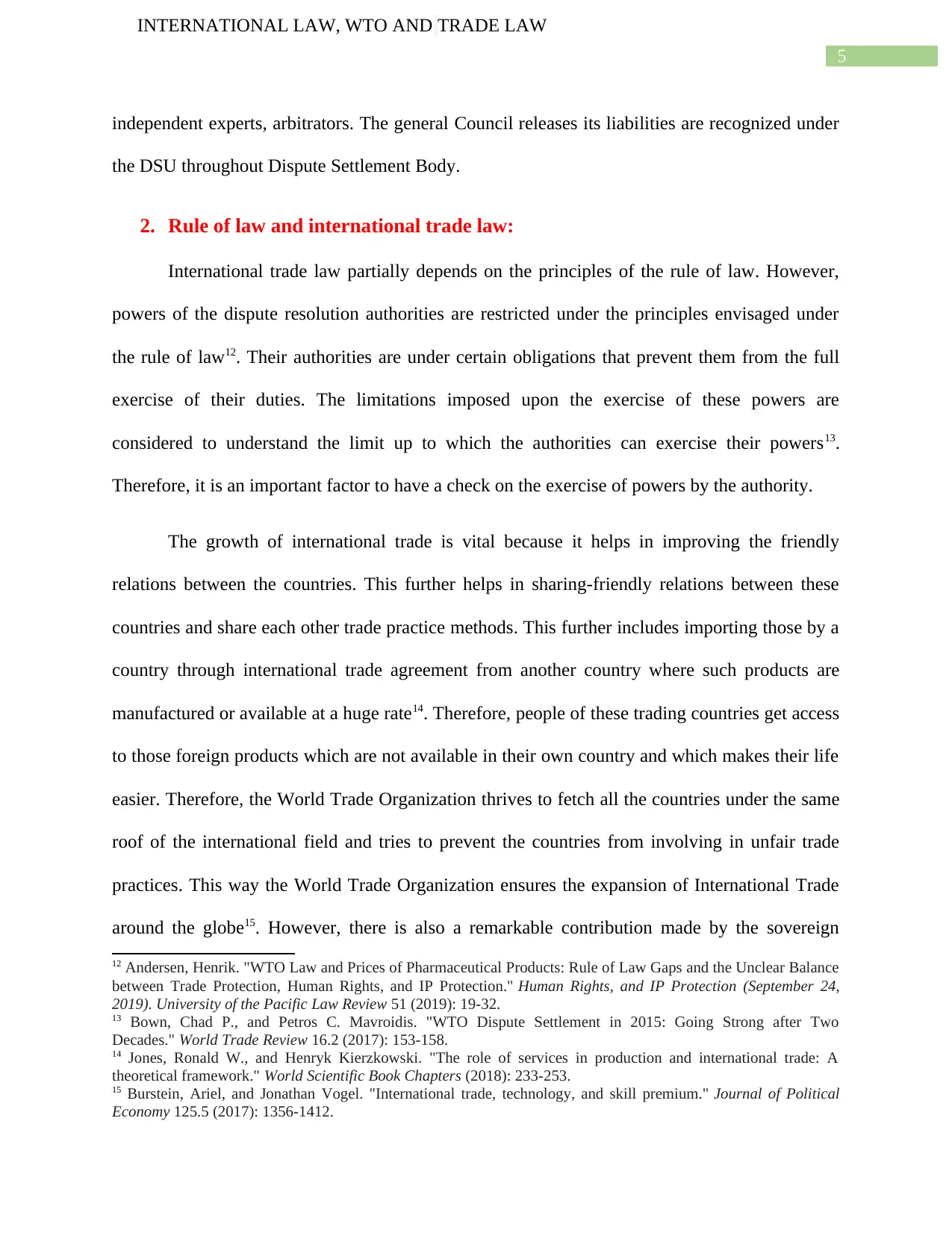
5
INTERNATIONAL LAW, WTO AND TRADE LAW
independent experts, arbitrators. The general Council releases its liabilities are recognized under
the DSU throughout Dispute Settlement Body.
2. Rule of law and international trade law:
International trade law partially depends on the principles of the rule of law. However,
powers of the dispute resolution authorities are restricted under the principles envisaged under
the rule of law12. Their authorities are under certain obligations that prevent them from the full
exercise of their duties. The limitations imposed upon the exercise of these powers are
considered to understand the limit up to which the authorities can exercise their powers13.
Therefore, it is an important factor to have a check on the exercise of powers by the authority.
The growth of international trade is vital because it helps in improving the friendly
relations between the countries. This further helps in sharing-friendly relations between these
countries and share each other trade practice methods. This further includes importing those by a
country through international trade agreement from another country where such products are
manufactured or available at a huge rate14. Therefore, people of these trading countries get access
to those foreign products which are not available in their own country and which makes their life
easier. Therefore, the World Trade Organization thrives to fetch all the countries under the same
roof of the international field and tries to prevent the countries from involving in unfair trade
practices. This way the World Trade Organization ensures the expansion of International Trade
around the globe15. However, there is also a remarkable contribution made by the sovereign
12 Andersen, Henrik. "WTO Law and Prices of Pharmaceutical Products: Rule of Law Gaps and the Unclear Balance
between Trade Protection, Human Rights, and IP Protection." Human Rights, and IP Protection (September 24,
2019). University of the Pacific Law Review 51 (2019): 19-32.
13 Bown, Chad P., and Petros C. Mavroidis. "WTO Dispute Settlement in 2015: Going Strong after Two
Decades." World Trade Review 16.2 (2017): 153-158.
14 Jones, Ronald W., and Henryk Kierzkowski. "The role of services in production and international trade: A
theoretical framework." World Scientific Book Chapters (2018): 233-253.
15 Burstein, Ariel, and Jonathan Vogel. "International trade, technology, and skill premium." Journal of Political
Economy 125.5 (2017): 1356-1412.
INTERNATIONAL LAW, WTO AND TRADE LAW
independent experts, arbitrators. The general Council releases its liabilities are recognized under
the DSU throughout Dispute Settlement Body.
2. Rule of law and international trade law:
International trade law partially depends on the principles of the rule of law. However,
powers of the dispute resolution authorities are restricted under the principles envisaged under
the rule of law12. Their authorities are under certain obligations that prevent them from the full
exercise of their duties. The limitations imposed upon the exercise of these powers are
considered to understand the limit up to which the authorities can exercise their powers13.
Therefore, it is an important factor to have a check on the exercise of powers by the authority.
The growth of international trade is vital because it helps in improving the friendly
relations between the countries. This further helps in sharing-friendly relations between these
countries and share each other trade practice methods. This further includes importing those by a
country through international trade agreement from another country where such products are
manufactured or available at a huge rate14. Therefore, people of these trading countries get access
to those foreign products which are not available in their own country and which makes their life
easier. Therefore, the World Trade Organization thrives to fetch all the countries under the same
roof of the international field and tries to prevent the countries from involving in unfair trade
practices. This way the World Trade Organization ensures the expansion of International Trade
around the globe15. However, there is also a remarkable contribution made by the sovereign
12 Andersen, Henrik. "WTO Law and Prices of Pharmaceutical Products: Rule of Law Gaps and the Unclear Balance
between Trade Protection, Human Rights, and IP Protection." Human Rights, and IP Protection (September 24,
2019). University of the Pacific Law Review 51 (2019): 19-32.
13 Bown, Chad P., and Petros C. Mavroidis. "WTO Dispute Settlement in 2015: Going Strong after Two
Decades." World Trade Review 16.2 (2017): 153-158.
14 Jones, Ronald W., and Henryk Kierzkowski. "The role of services in production and international trade: A
theoretical framework." World Scientific Book Chapters (2018): 233-253.
15 Burstein, Ariel, and Jonathan Vogel. "International trade, technology, and skill premium." Journal of Political
Economy 125.5 (2017): 1356-1412.
⊘ This is a preview!⊘
Do you want full access?
Subscribe today to unlock all pages.

Trusted by 1+ million students worldwide
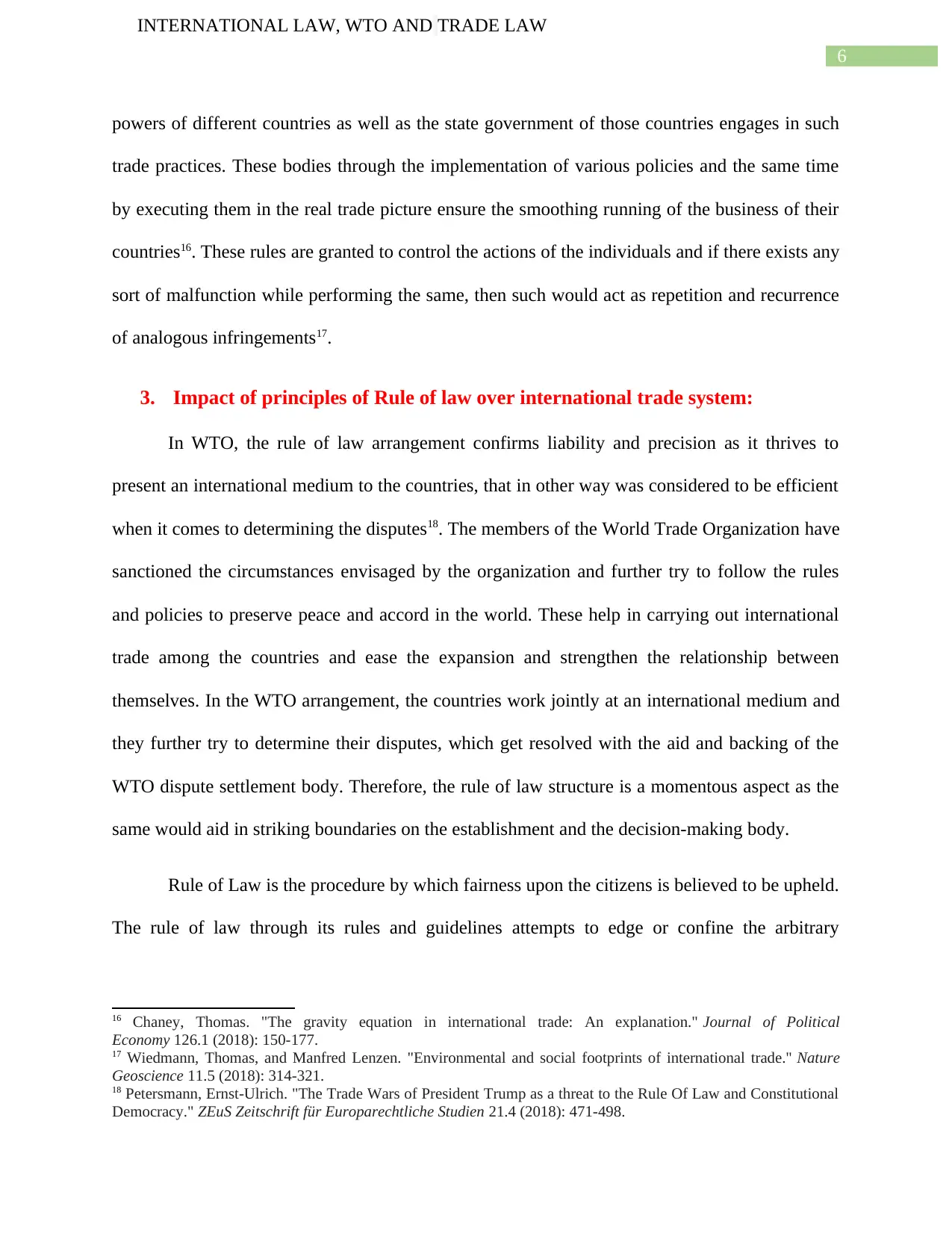
6
INTERNATIONAL LAW, WTO AND TRADE LAW
powers of different countries as well as the state government of those countries engages in such
trade practices. These bodies through the implementation of various policies and the same time
by executing them in the real trade picture ensure the smoothing running of the business of their
countries16. These rules are granted to control the actions of the individuals and if there exists any
sort of malfunction while performing the same, then such would act as repetition and recurrence
of analogous infringements17.
3. Impact of principles of Rule of law over international trade system:
In WTO, the rule of law arrangement confirms liability and precision as it thrives to
present an international medium to the countries, that in other way was considered to be efficient
when it comes to determining the disputes18. The members of the World Trade Organization have
sanctioned the circumstances envisaged by the organization and further try to follow the rules
and policies to preserve peace and accord in the world. These help in carrying out international
trade among the countries and ease the expansion and strengthen the relationship between
themselves. In the WTO arrangement, the countries work jointly at an international medium and
they further try to determine their disputes, which get resolved with the aid and backing of the
WTO dispute settlement body. Therefore, the rule of law structure is a momentous aspect as the
same would aid in striking boundaries on the establishment and the decision-making body.
Rule of Law is the procedure by which fairness upon the citizens is believed to be upheld.
The rule of law through its rules and guidelines attempts to edge or confine the arbitrary
16 Chaney, Thomas. "The gravity equation in international trade: An explanation." Journal of Political
Economy 126.1 (2018): 150-177.
17 Wiedmann, Thomas, and Manfred Lenzen. "Environmental and social footprints of international trade." Nature
Geoscience 11.5 (2018): 314-321.
18 Petersmann, Ernst-Ulrich. "The Trade Wars of President Trump as a threat to the Rule Of Law and Constitutional
Democracy." ZEuS Zeitschrift für Europarechtliche Studien 21.4 (2018): 471-498.
INTERNATIONAL LAW, WTO AND TRADE LAW
powers of different countries as well as the state government of those countries engages in such
trade practices. These bodies through the implementation of various policies and the same time
by executing them in the real trade picture ensure the smoothing running of the business of their
countries16. These rules are granted to control the actions of the individuals and if there exists any
sort of malfunction while performing the same, then such would act as repetition and recurrence
of analogous infringements17.
3. Impact of principles of Rule of law over international trade system:
In WTO, the rule of law arrangement confirms liability and precision as it thrives to
present an international medium to the countries, that in other way was considered to be efficient
when it comes to determining the disputes18. The members of the World Trade Organization have
sanctioned the circumstances envisaged by the organization and further try to follow the rules
and policies to preserve peace and accord in the world. These help in carrying out international
trade among the countries and ease the expansion and strengthen the relationship between
themselves. In the WTO arrangement, the countries work jointly at an international medium and
they further try to determine their disputes, which get resolved with the aid and backing of the
WTO dispute settlement body. Therefore, the rule of law structure is a momentous aspect as the
same would aid in striking boundaries on the establishment and the decision-making body.
Rule of Law is the procedure by which fairness upon the citizens is believed to be upheld.
The rule of law through its rules and guidelines attempts to edge or confine the arbitrary
16 Chaney, Thomas. "The gravity equation in international trade: An explanation." Journal of Political
Economy 126.1 (2018): 150-177.
17 Wiedmann, Thomas, and Manfred Lenzen. "Environmental and social footprints of international trade." Nature
Geoscience 11.5 (2018): 314-321.
18 Petersmann, Ernst-Ulrich. "The Trade Wars of President Trump as a threat to the Rule Of Law and Constitutional
Democracy." ZEuS Zeitschrift für Europarechtliche Studien 21.4 (2018): 471-498.
Paraphrase This Document
Need a fresh take? Get an instant paraphrase of this document with our AI Paraphraser
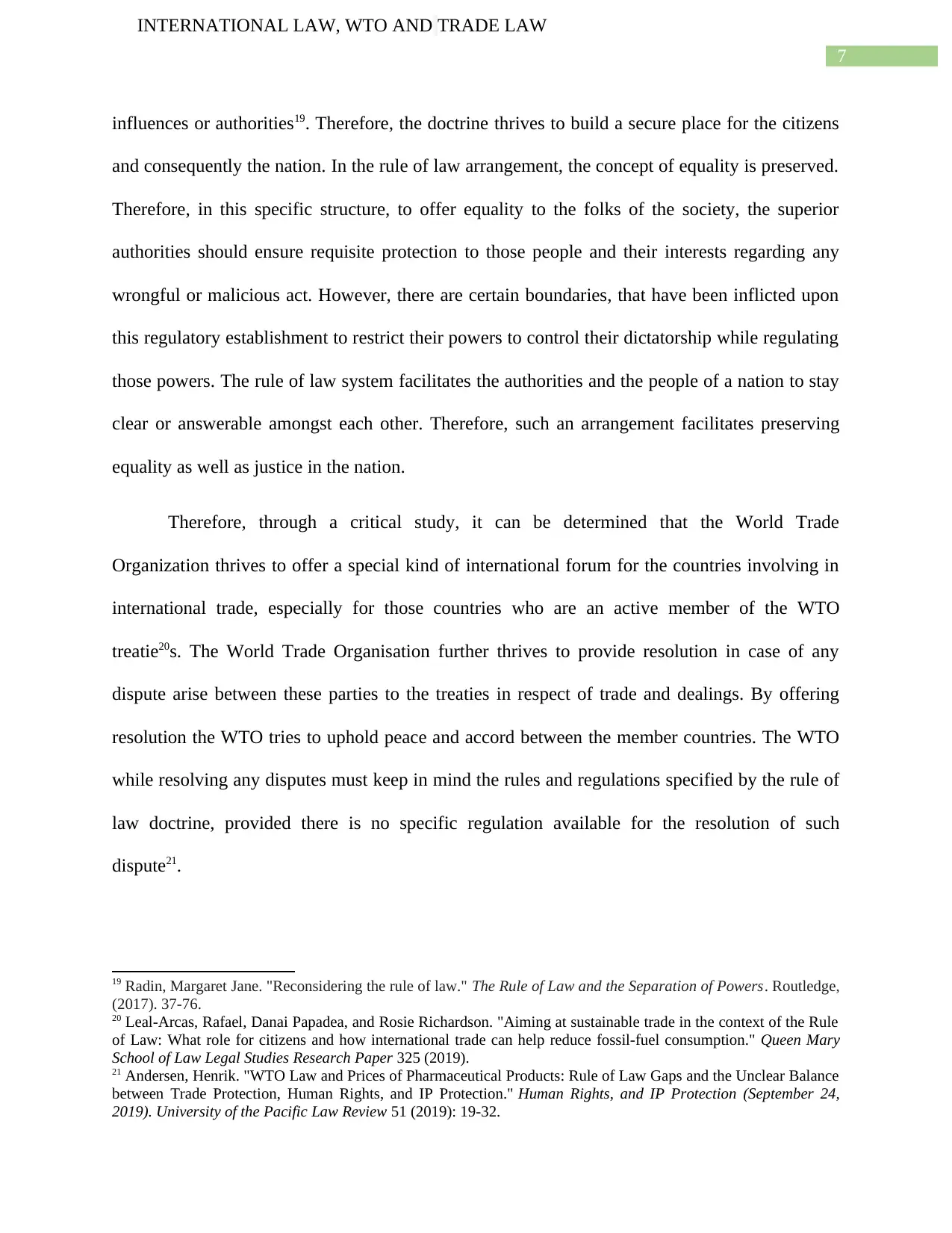
7
INTERNATIONAL LAW, WTO AND TRADE LAW
influences or authorities19. Therefore, the doctrine thrives to build a secure place for the citizens
and consequently the nation. In the rule of law arrangement, the concept of equality is preserved.
Therefore, in this specific structure, to offer equality to the folks of the society, the superior
authorities should ensure requisite protection to those people and their interests regarding any
wrongful or malicious act. However, there are certain boundaries, that have been inflicted upon
this regulatory establishment to restrict their powers to control their dictatorship while regulating
those powers. The rule of law system facilitates the authorities and the people of a nation to stay
clear or answerable amongst each other. Therefore, such an arrangement facilitates preserving
equality as well as justice in the nation.
Therefore, through a critical study, it can be determined that the World Trade
Organization thrives to offer a special kind of international forum for the countries involving in
international trade, especially for those countries who are an active member of the WTO
treatie20s. The World Trade Organisation further thrives to provide resolution in case of any
dispute arise between these parties to the treaties in respect of trade and dealings. By offering
resolution the WTO tries to uphold peace and accord between the member countries. The WTO
while resolving any disputes must keep in mind the rules and regulations specified by the rule of
law doctrine, provided there is no specific regulation available for the resolution of such
dispute21.
19 Radin, Margaret Jane. "Reconsidering the rule of law." The Rule of Law and the Separation of Powers. Routledge,
(2017). 37-76.
20 Leal-Arcas, Rafael, Danai Papadea, and Rosie Richardson. "Aiming at sustainable trade in the context of the Rule
of Law: What role for citizens and how international trade can help reduce fossil-fuel consumption." Queen Mary
School of Law Legal Studies Research Paper 325 (2019).
21 Andersen, Henrik. "WTO Law and Prices of Pharmaceutical Products: Rule of Law Gaps and the Unclear Balance
between Trade Protection, Human Rights, and IP Protection." Human Rights, and IP Protection (September 24,
2019). University of the Pacific Law Review 51 (2019): 19-32.
INTERNATIONAL LAW, WTO AND TRADE LAW
influences or authorities19. Therefore, the doctrine thrives to build a secure place for the citizens
and consequently the nation. In the rule of law arrangement, the concept of equality is preserved.
Therefore, in this specific structure, to offer equality to the folks of the society, the superior
authorities should ensure requisite protection to those people and their interests regarding any
wrongful or malicious act. However, there are certain boundaries, that have been inflicted upon
this regulatory establishment to restrict their powers to control their dictatorship while regulating
those powers. The rule of law system facilitates the authorities and the people of a nation to stay
clear or answerable amongst each other. Therefore, such an arrangement facilitates preserving
equality as well as justice in the nation.
Therefore, through a critical study, it can be determined that the World Trade
Organization thrives to offer a special kind of international forum for the countries involving in
international trade, especially for those countries who are an active member of the WTO
treatie20s. The World Trade Organisation further thrives to provide resolution in case of any
dispute arise between these parties to the treaties in respect of trade and dealings. By offering
resolution the WTO tries to uphold peace and accord between the member countries. The WTO
while resolving any disputes must keep in mind the rules and regulations specified by the rule of
law doctrine, provided there is no specific regulation available for the resolution of such
dispute21.
19 Radin, Margaret Jane. "Reconsidering the rule of law." The Rule of Law and the Separation of Powers. Routledge,
(2017). 37-76.
20 Leal-Arcas, Rafael, Danai Papadea, and Rosie Richardson. "Aiming at sustainable trade in the context of the Rule
of Law: What role for citizens and how international trade can help reduce fossil-fuel consumption." Queen Mary
School of Law Legal Studies Research Paper 325 (2019).
21 Andersen, Henrik. "WTO Law and Prices of Pharmaceutical Products: Rule of Law Gaps and the Unclear Balance
between Trade Protection, Human Rights, and IP Protection." Human Rights, and IP Protection (September 24,
2019). University of the Pacific Law Review 51 (2019): 19-32.
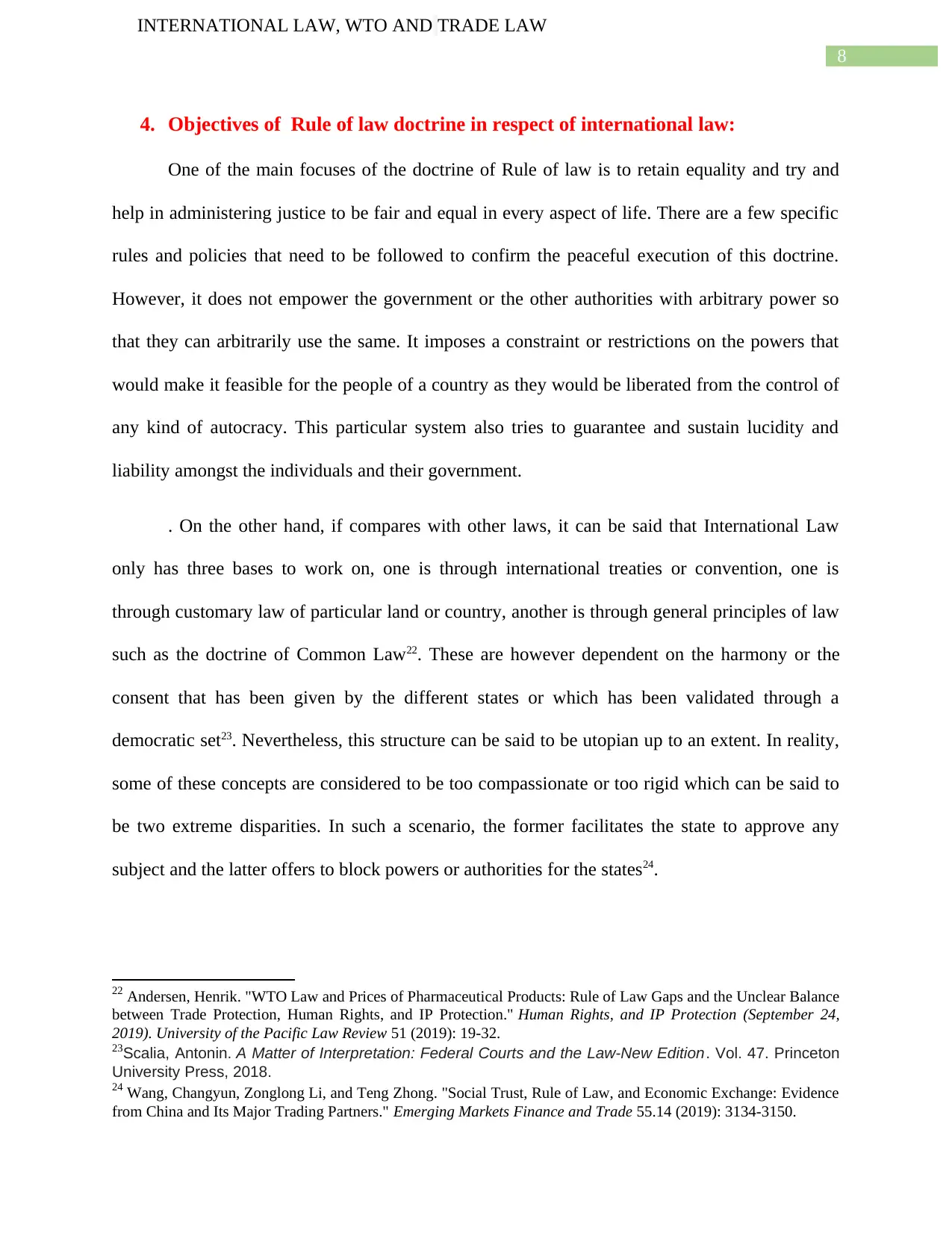
8
INTERNATIONAL LAW, WTO AND TRADE LAW
4. Objectives of Rule of law doctrine in respect of international law:
One of the main focuses of the doctrine of Rule of law is to retain equality and try and
help in administering justice to be fair and equal in every aspect of life. There are a few specific
rules and policies that need to be followed to confirm the peaceful execution of this doctrine.
However, it does not empower the government or the other authorities with arbitrary power so
that they can arbitrarily use the same. It imposes a constraint or restrictions on the powers that
would make it feasible for the people of a country as they would be liberated from the control of
any kind of autocracy. This particular system also tries to guarantee and sustain lucidity and
liability amongst the individuals and their government.
. On the other hand, if compares with other laws, it can be said that International Law
only has three bases to work on, one is through international treaties or convention, one is
through customary law of particular land or country, another is through general principles of law
such as the doctrine of Common Law22. These are however dependent on the harmony or the
consent that has been given by the different states or which has been validated through a
democratic set23. Nevertheless, this structure can be said to be utopian up to an extent. In reality,
some of these concepts are considered to be too compassionate or too rigid which can be said to
be two extreme disparities. In such a scenario, the former facilitates the state to approve any
subject and the latter offers to block powers or authorities for the states24.
22 Andersen, Henrik. "WTO Law and Prices of Pharmaceutical Products: Rule of Law Gaps and the Unclear Balance
between Trade Protection, Human Rights, and IP Protection." Human Rights, and IP Protection (September 24,
2019). University of the Pacific Law Review 51 (2019): 19-32.
23Scalia, Antonin. A Matter of Interpretation: Federal Courts and the Law-New Edition. Vol. 47. Princeton
University Press, 2018.
24 Wang, Changyun, Zonglong Li, and Teng Zhong. "Social Trust, Rule of Law, and Economic Exchange: Evidence
from China and Its Major Trading Partners." Emerging Markets Finance and Trade 55.14 (2019): 3134-3150.
INTERNATIONAL LAW, WTO AND TRADE LAW
4. Objectives of Rule of law doctrine in respect of international law:
One of the main focuses of the doctrine of Rule of law is to retain equality and try and
help in administering justice to be fair and equal in every aspect of life. There are a few specific
rules and policies that need to be followed to confirm the peaceful execution of this doctrine.
However, it does not empower the government or the other authorities with arbitrary power so
that they can arbitrarily use the same. It imposes a constraint or restrictions on the powers that
would make it feasible for the people of a country as they would be liberated from the control of
any kind of autocracy. This particular system also tries to guarantee and sustain lucidity and
liability amongst the individuals and their government.
. On the other hand, if compares with other laws, it can be said that International Law
only has three bases to work on, one is through international treaties or convention, one is
through customary law of particular land or country, another is through general principles of law
such as the doctrine of Common Law22. These are however dependent on the harmony or the
consent that has been given by the different states or which has been validated through a
democratic set23. Nevertheless, this structure can be said to be utopian up to an extent. In reality,
some of these concepts are considered to be too compassionate or too rigid which can be said to
be two extreme disparities. In such a scenario, the former facilitates the state to approve any
subject and the latter offers to block powers or authorities for the states24.
22 Andersen, Henrik. "WTO Law and Prices of Pharmaceutical Products: Rule of Law Gaps and the Unclear Balance
between Trade Protection, Human Rights, and IP Protection." Human Rights, and IP Protection (September 24,
2019). University of the Pacific Law Review 51 (2019): 19-32.
23Scalia, Antonin. A Matter of Interpretation: Federal Courts and the Law-New Edition. Vol. 47. Princeton
University Press, 2018.
24 Wang, Changyun, Zonglong Li, and Teng Zhong. "Social Trust, Rule of Law, and Economic Exchange: Evidence
from China and Its Major Trading Partners." Emerging Markets Finance and Trade 55.14 (2019): 3134-3150.
⊘ This is a preview!⊘
Do you want full access?
Subscribe today to unlock all pages.

Trusted by 1+ million students worldwide
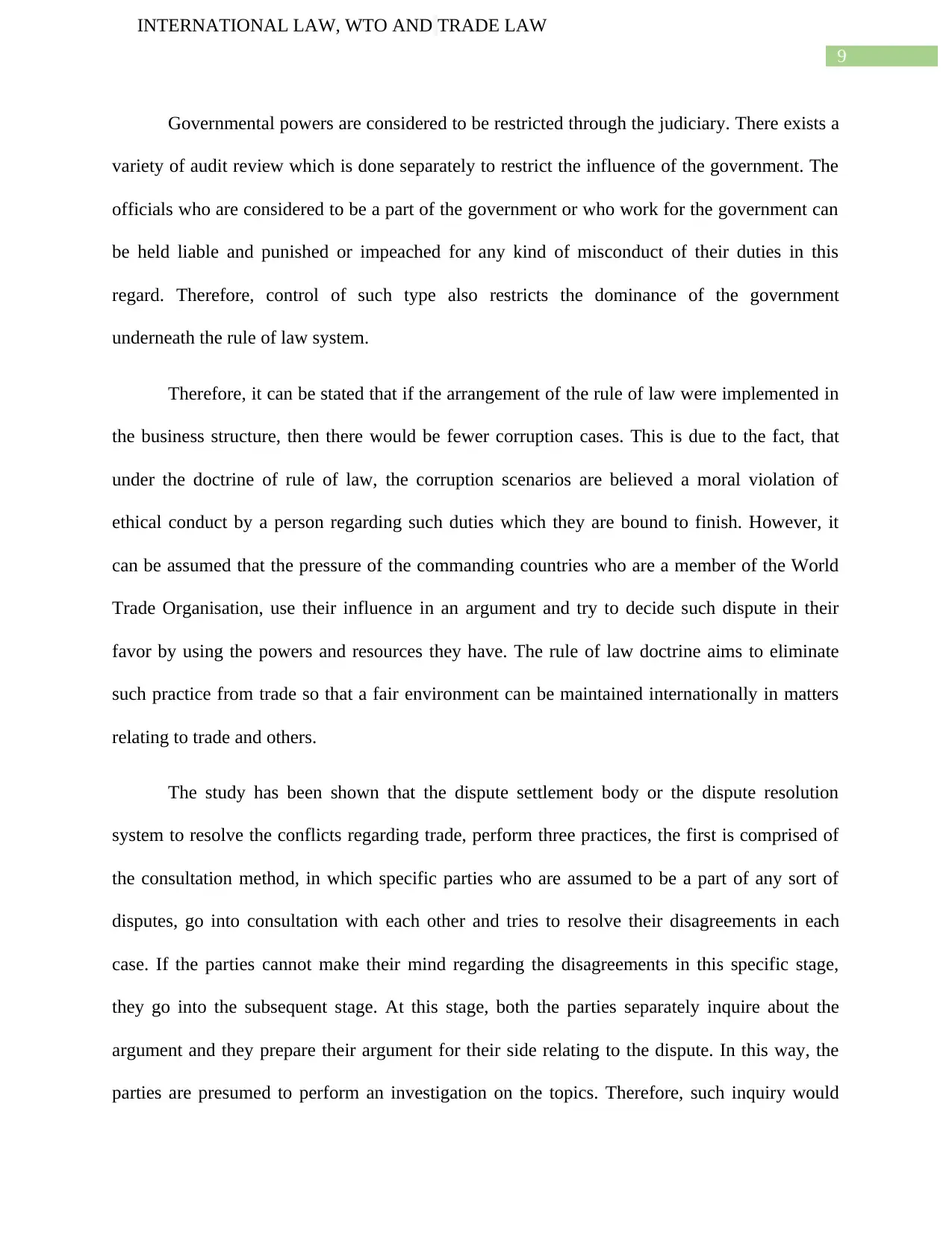
9
INTERNATIONAL LAW, WTO AND TRADE LAW
Governmental powers are considered to be restricted through the judiciary. There exists a
variety of audit review which is done separately to restrict the influence of the government. The
officials who are considered to be a part of the government or who work for the government can
be held liable and punished or impeached for any kind of misconduct of their duties in this
regard. Therefore, control of such type also restricts the dominance of the government
underneath the rule of law system.
Therefore, it can be stated that if the arrangement of the rule of law were implemented in
the business structure, then there would be fewer corruption cases. This is due to the fact, that
under the doctrine of rule of law, the corruption scenarios are believed a moral violation of
ethical conduct by a person regarding such duties which they are bound to finish. However, it
can be assumed that the pressure of the commanding countries who are a member of the World
Trade Organisation, use their influence in an argument and try to decide such dispute in their
favor by using the powers and resources they have. The rule of law doctrine aims to eliminate
such practice from trade so that a fair environment can be maintained internationally in matters
relating to trade and others.
The study has been shown that the dispute settlement body or the dispute resolution
system to resolve the conflicts regarding trade, perform three practices, the first is comprised of
the consultation method, in which specific parties who are assumed to be a part of any sort of
disputes, go into consultation with each other and tries to resolve their disagreements in each
case. If the parties cannot make their mind regarding the disagreements in this specific stage,
they go into the subsequent stage. At this stage, both the parties separately inquire about the
argument and they prepare their argument for their side relating to the dispute. In this way, the
parties are presumed to perform an investigation on the topics. Therefore, such inquiry would
INTERNATIONAL LAW, WTO AND TRADE LAW
Governmental powers are considered to be restricted through the judiciary. There exists a
variety of audit review which is done separately to restrict the influence of the government. The
officials who are considered to be a part of the government or who work for the government can
be held liable and punished or impeached for any kind of misconduct of their duties in this
regard. Therefore, control of such type also restricts the dominance of the government
underneath the rule of law system.
Therefore, it can be stated that if the arrangement of the rule of law were implemented in
the business structure, then there would be fewer corruption cases. This is due to the fact, that
under the doctrine of rule of law, the corruption scenarios are believed a moral violation of
ethical conduct by a person regarding such duties which they are bound to finish. However, it
can be assumed that the pressure of the commanding countries who are a member of the World
Trade Organisation, use their influence in an argument and try to decide such dispute in their
favor by using the powers and resources they have. The rule of law doctrine aims to eliminate
such practice from trade so that a fair environment can be maintained internationally in matters
relating to trade and others.
The study has been shown that the dispute settlement body or the dispute resolution
system to resolve the conflicts regarding trade, perform three practices, the first is comprised of
the consultation method, in which specific parties who are assumed to be a part of any sort of
disputes, go into consultation with each other and tries to resolve their disagreements in each
case. If the parties cannot make their mind regarding the disagreements in this specific stage,
they go into the subsequent stage. At this stage, both the parties separately inquire about the
argument and they prepare their argument for their side relating to the dispute. In this way, the
parties are presumed to perform an investigation on the topics. Therefore, such inquiry would
Paraphrase This Document
Need a fresh take? Get an instant paraphrase of this document with our AI Paraphraser
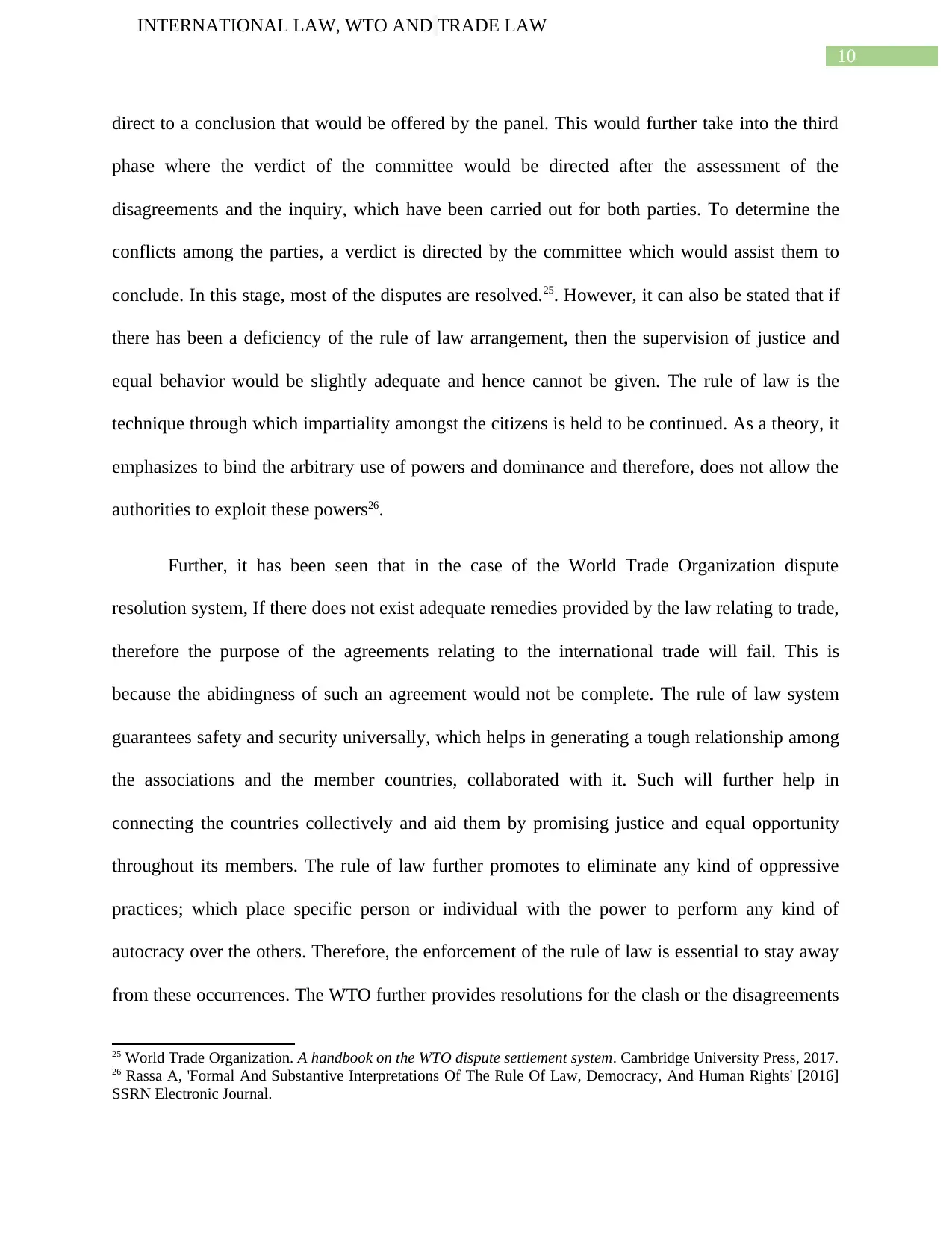
10
INTERNATIONAL LAW, WTO AND TRADE LAW
direct to a conclusion that would be offered by the panel. This would further take into the third
phase where the verdict of the committee would be directed after the assessment of the
disagreements and the inquiry, which have been carried out for both parties. To determine the
conflicts among the parties, a verdict is directed by the committee which would assist them to
conclude. In this stage, most of the disputes are resolved.25. However, it can also be stated that if
there has been a deficiency of the rule of law arrangement, then the supervision of justice and
equal behavior would be slightly adequate and hence cannot be given. The rule of law is the
technique through which impartiality amongst the citizens is held to be continued. As a theory, it
emphasizes to bind the arbitrary use of powers and dominance and therefore, does not allow the
authorities to exploit these powers26.
Further, it has been seen that in the case of the World Trade Organization dispute
resolution system, If there does not exist adequate remedies provided by the law relating to trade,
therefore the purpose of the agreements relating to the international trade will fail. This is
because the abidingness of such an agreement would not be complete. The rule of law system
guarantees safety and security universally, which helps in generating a tough relationship among
the associations and the member countries, collaborated with it. Such will further help in
connecting the countries collectively and aid them by promising justice and equal opportunity
throughout its members. The rule of law further promotes to eliminate any kind of oppressive
practices; which place specific person or individual with the power to perform any kind of
autocracy over the others. Therefore, the enforcement of the rule of law is essential to stay away
from these occurrences. The WTO further provides resolutions for the clash or the disagreements
25 World Trade Organization. A handbook on the WTO dispute settlement system. Cambridge University Press, 2017.
26 Rassa A, 'Formal And Substantive Interpretations Of The Rule Of Law, Democracy, And Human Rights' [2016]
SSRN Electronic Journal.
INTERNATIONAL LAW, WTO AND TRADE LAW
direct to a conclusion that would be offered by the panel. This would further take into the third
phase where the verdict of the committee would be directed after the assessment of the
disagreements and the inquiry, which have been carried out for both parties. To determine the
conflicts among the parties, a verdict is directed by the committee which would assist them to
conclude. In this stage, most of the disputes are resolved.25. However, it can also be stated that if
there has been a deficiency of the rule of law arrangement, then the supervision of justice and
equal behavior would be slightly adequate and hence cannot be given. The rule of law is the
technique through which impartiality amongst the citizens is held to be continued. As a theory, it
emphasizes to bind the arbitrary use of powers and dominance and therefore, does not allow the
authorities to exploit these powers26.
Further, it has been seen that in the case of the World Trade Organization dispute
resolution system, If there does not exist adequate remedies provided by the law relating to trade,
therefore the purpose of the agreements relating to the international trade will fail. This is
because the abidingness of such an agreement would not be complete. The rule of law system
guarantees safety and security universally, which helps in generating a tough relationship among
the associations and the member countries, collaborated with it. Such will further help in
connecting the countries collectively and aid them by promising justice and equal opportunity
throughout its members. The rule of law further promotes to eliminate any kind of oppressive
practices; which place specific person or individual with the power to perform any kind of
autocracy over the others. Therefore, the enforcement of the rule of law is essential to stay away
from these occurrences. The WTO further provides resolutions for the clash or the disagreements
25 World Trade Organization. A handbook on the WTO dispute settlement system. Cambridge University Press, 2017.
26 Rassa A, 'Formal And Substantive Interpretations Of The Rule Of Law, Democracy, And Human Rights' [2016]
SSRN Electronic Journal.
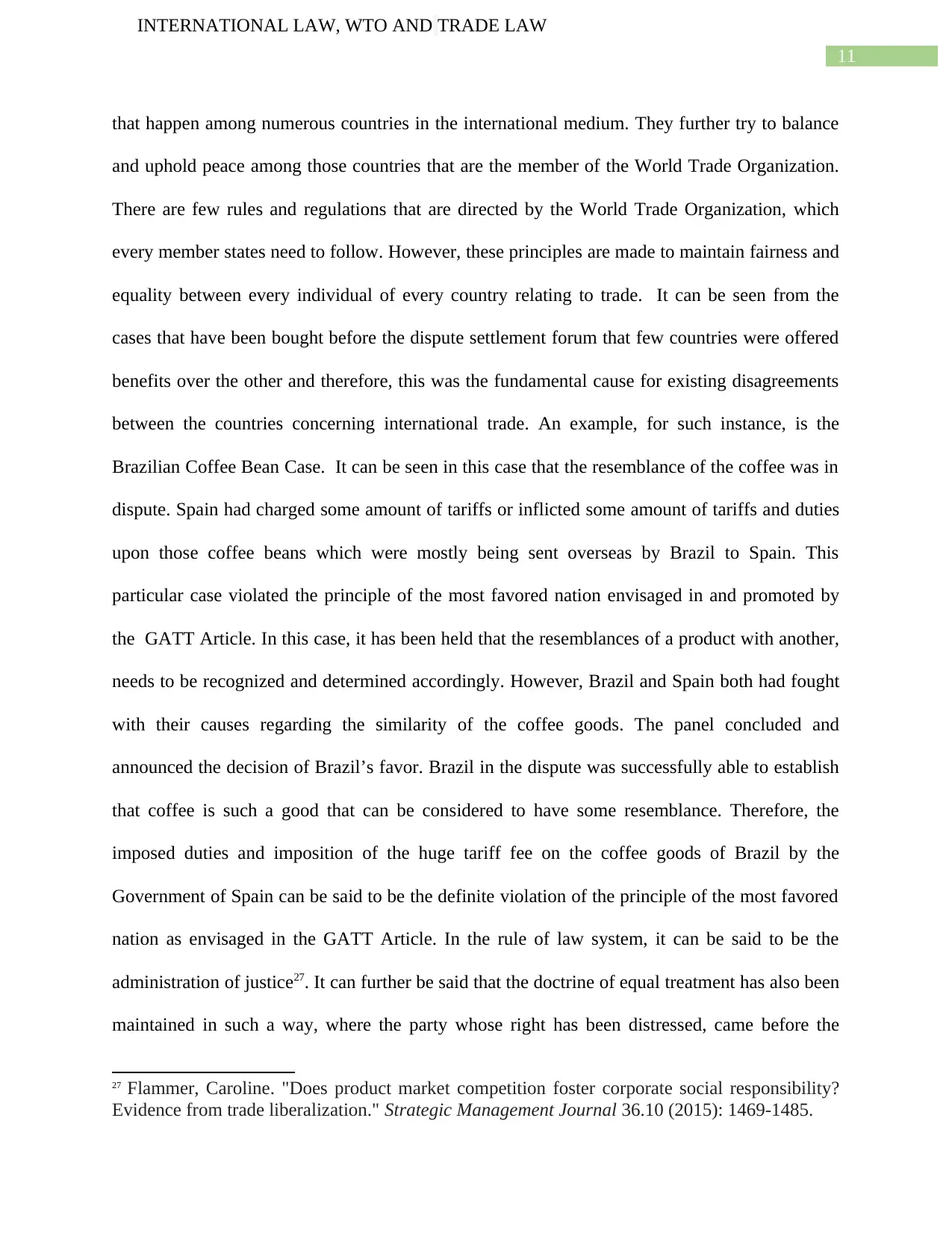
11
INTERNATIONAL LAW, WTO AND TRADE LAW
that happen among numerous countries in the international medium. They further try to balance
and uphold peace among those countries that are the member of the World Trade Organization.
There are few rules and regulations that are directed by the World Trade Organization, which
every member states need to follow. However, these principles are made to maintain fairness and
equality between every individual of every country relating to trade. It can be seen from the
cases that have been bought before the dispute settlement forum that few countries were offered
benefits over the other and therefore, this was the fundamental cause for existing disagreements
between the countries concerning international trade. An example, for such instance, is the
Brazilian Coffee Bean Case. It can be seen in this case that the resemblance of the coffee was in
dispute. Spain had charged some amount of tariffs or inflicted some amount of tariffs and duties
upon those coffee beans which were mostly being sent overseas by Brazil to Spain. This
particular case violated the principle of the most favored nation envisaged in and promoted by
the GATT Article. In this case, it has been held that the resemblances of a product with another,
needs to be recognized and determined accordingly. However, Brazil and Spain both had fought
with their causes regarding the similarity of the coffee goods. The panel concluded and
announced the decision of Brazil’s favor. Brazil in the dispute was successfully able to establish
that coffee is such a good that can be considered to have some resemblance. Therefore, the
imposed duties and imposition of the huge tariff fee on the coffee goods of Brazil by the
Government of Spain can be said to be the definite violation of the principle of the most favored
nation as envisaged in the GATT Article. In the rule of law system, it can be said to be the
administration of justice27. It can further be said that the doctrine of equal treatment has also been
maintained in such a way, where the party whose right has been distressed, came before the
27 Flammer, Caroline. "Does product market competition foster corporate social responsibility?
Evidence from trade liberalization." Strategic Management Journal 36.10 (2015): 1469-1485.
INTERNATIONAL LAW, WTO AND TRADE LAW
that happen among numerous countries in the international medium. They further try to balance
and uphold peace among those countries that are the member of the World Trade Organization.
There are few rules and regulations that are directed by the World Trade Organization, which
every member states need to follow. However, these principles are made to maintain fairness and
equality between every individual of every country relating to trade. It can be seen from the
cases that have been bought before the dispute settlement forum that few countries were offered
benefits over the other and therefore, this was the fundamental cause for existing disagreements
between the countries concerning international trade. An example, for such instance, is the
Brazilian Coffee Bean Case. It can be seen in this case that the resemblance of the coffee was in
dispute. Spain had charged some amount of tariffs or inflicted some amount of tariffs and duties
upon those coffee beans which were mostly being sent overseas by Brazil to Spain. This
particular case violated the principle of the most favored nation envisaged in and promoted by
the GATT Article. In this case, it has been held that the resemblances of a product with another,
needs to be recognized and determined accordingly. However, Brazil and Spain both had fought
with their causes regarding the similarity of the coffee goods. The panel concluded and
announced the decision of Brazil’s favor. Brazil in the dispute was successfully able to establish
that coffee is such a good that can be considered to have some resemblance. Therefore, the
imposed duties and imposition of the huge tariff fee on the coffee goods of Brazil by the
Government of Spain can be said to be the definite violation of the principle of the most favored
nation as envisaged in the GATT Article. In the rule of law system, it can be said to be the
administration of justice27. It can further be said that the doctrine of equal treatment has also been
maintained in such a way, where the party whose right has been distressed, came before the
27 Flammer, Caroline. "Does product market competition foster corporate social responsibility?
Evidence from trade liberalization." Strategic Management Journal 36.10 (2015): 1469-1485.
⊘ This is a preview!⊘
Do you want full access?
Subscribe today to unlock all pages.

Trusted by 1+ million students worldwide
1 out of 17
Related Documents
Your All-in-One AI-Powered Toolkit for Academic Success.
+13062052269
info@desklib.com
Available 24*7 on WhatsApp / Email
![[object Object]](/_next/static/media/star-bottom.7253800d.svg)
Unlock your academic potential
Copyright © 2020–2026 A2Z Services. All Rights Reserved. Developed and managed by ZUCOL.





